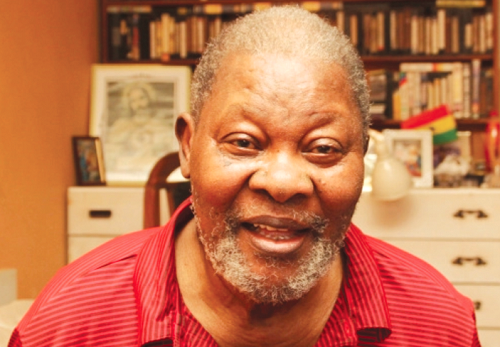
‘Gen Erskine is no more!’ Adieu, General
”GEN. Erskine is no more” was the terse message announcing the death of Lt Gen. Emmanuel Alexander Erskine at the 37 Military Hospital on May 7, 2021 at age 86.
In his column in the Daily Graphic of April 9, 2021, Communications Consultant and veteran writer Enimil Ashon, celebrating Dr Joyce Aryee on her 75th birthday stated as follows:
“It is impossible to write about Dr Joyce Aryee in the Daily Graphic. In this column, I cannot go beyond 700-750 words. The number of boards on which she sits, is, alone, enough to fill the space...”
I find myself in a similar situation as Mr Ashon in my attempt to write about Gen. Erskine, as I am subject to the same words restriction.
Given who General Erskine was, 750 words are not enough for my introductory paragraph alone of him.
The General
He called me ‘Kofio’, his abridge version of my pen-name Kofi Chokosi for my column in the Ghana Armed Force Quarterly, the AFNEWS since 1985, “Kofi Chokosi Speaks.”
When I was commissioned in 1973, Ghana’s Army Commander was then Brigadier (General) Erskine.
My earliest distant encounter with him was in 1975 in the Sinai Desert, Egypt on my first UN peacekeeping mission, the United Nations Emergency Force (UNEF) 2.
He was the Deputy Force Commander to Maj Gen. Ensio Silasvio of Finland. In 1976, he was appointed the Chief Military Observer/Force Commander for the UN Truce Supervisioln Organisation (UNTSO) and promoted Major-General. His headquarters was in Jerusalem, Israel.
Visit to Israel
An early action of his was to facilitate the visit to Jerusalem by Ghanaian soldiers. So, as a young officer, I saw the Wailing Wall, Garden of Gethsemane, Via Dolorosa (the route Jesus carried the cross on) and many places I had only read about.
Indeed, an officer who on return to Ghana told his mother he had been to Jerusalem caused a stir. The Old lady asked “my son, are you going crazy? How can you tell me you went to Jerusalem when Jerusalem is in Heaven?”
She thought the son needed psychiatric attention for claiming he had seen Jerusalem on earth.
UNIFIL
In 1978, the UN created a new force, the United Nations Interim Force in Lebanon (UNIFIL).
For the first time in UN history, an African was appointed the force commander.
Gen. Erskine’s exceptional performance as the force commander did not only endear him to his troops but more importantly to the Lebanese and also the Israelis.
Indeed, baby-boys born in Lebanon were named ‘Erskine’ after the general.
Without doubt, Gen. Erskine helped put Ghana on the peacekeeping map, making Ghana a credible internationally recognised peacekeeping nation.
Qualities
Gen. Erskine was a six-footer and had an imposing and initially intimidating personality. However, underneath this lay a calm, affable, pleasant nature which endeared him to all.
After retirement, he worked as a UN consultant and an under-secretary-general.
In February 2001, Zimbabwe established a peace organisation, the Centre for Peace Initiatives in Africa (CPIA) based in Harare.
Gen. Erskine was the first chairman of the Board of Trustees. The CPIA had the Gen. Erskine Research and Documentation Centre (GERDC) named in his honour.
It was officially opened by him in September 2001. The GERDC also launched an Annual Lecture Series. Gen Erskine delivered the first lecture.
He was a member of the National Reconciliation Commission in 2001, which investigated atrocities committed in the 1979 and 1981 revolutions. He was also a member of the Armed Forces Restructuring Committee.
Regret
In one of our conversations, he advised, “Kofio, when you retire, don’t make the mistake I made by going into politics. If there is one decision I regret in my life, it is the decision to go into politics. Soldiering and politics are two different things.”
He was referring to the Peoples Heritage Party, which he founded and contested for in the 1992 presidential elections.
Conclusion
Chatting with an African colleague long ago, he said “how I wish my country has a General like Gen Erskine!” Fortunately, Ghana had him and he made Ghana proud.
His outstanding UNIFIL performance as the first African force commander paved the way for subsequent brilliant African force commanders such as Gen Seth Obeng, who commanded the Observer Force in Angola (MONUA) and later UNIFIL.
Unlike Zimbabwe, which in 2001 honoured Gen. Erskine by naming an institution after him when he was alive, Ghana might hopefully, do so posthumously.
Ghanaians, let us honour our heroes when they are alive and not wait till they die. Ghana has lost a hero!
Gallant General, you have paid your dues to Ghana and the world. Rest in peace! Fellow Ghanaians, wake up!
The writer is Former CEO, African Peace Support Trainers Association, Nairobi, Kenya & Council Chairman, Family Health University College, Accra
E-mail:
